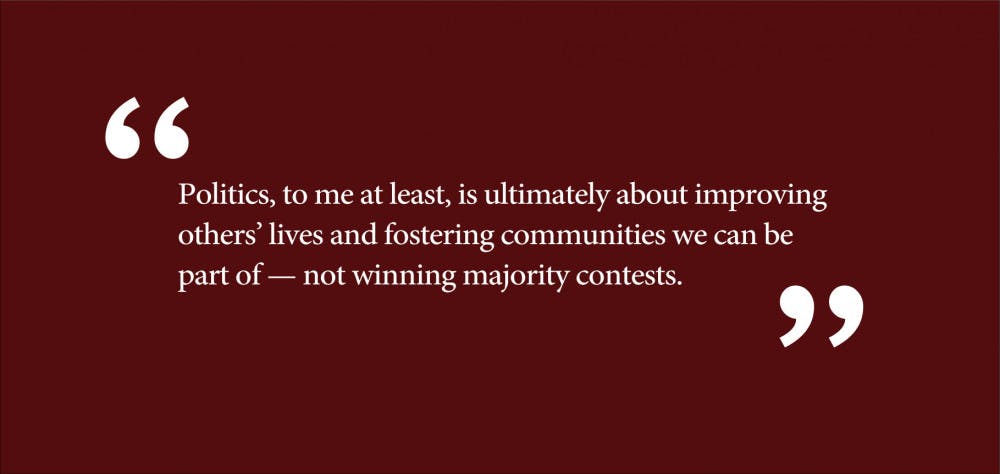The 2018 midterm elections happened about a month ago. Public engagement was high, but now that the results have all been tallied, it feels like political interest has died down on campus. This reflects a prevailing idea that a citizen’s job in a democracy starts and ends on Election Day. An Election Day announcement from the Swearer Center for Public Service embodies that thought. It read: “Your vote is your voice! The midterm elections are TODAY.”
Swearer should be promoting civic engagement, but they have a core point wrong: your vote is not your voice. This common refrain promotes the notion that casting a ballot is the only way citizens can meaningfully participate in democracy. That idea wrongfully delimits democratic engagement as a once-every-two-years endeavor and disempowers citizens in their everyday interactions. Citizens have their voices 365 days of the year. For democracy to flourish, everyone has to use those voices to speak out about what matters to them, both inside and outside the realm of formal politics.
“Your vote is your voice,” is probably meant to convey that voting is the most tangible form of civic participation. But if your vote is your voice, then citizens’ voices are little more than a faint whisper. In U.S. elections, the secret ballot system means that voting is not a publicly communicative act; state records show who voted, but not whom anyone voted for, meaning your vote doesn’t signal to anyone what you believe in. What’s more, your vote has functionally no impact on the outcome of any election, as the likelihood of a single vote being determinative is essentially zero, with rare exceptions. If your voice is your vote, and your vote neither publicly communicates anything nor affects who wins elections, then it would seem like you don’t have much of a voice.
Fortunately, though, if you realize you can use your voice on days other than election days, you’ll find seemingly unending opportunities to speak democratically. Just in the realm of formal politics, citizens can speak by contacting representatives, asking questions at debates, submitting public comment on regulations or canvassing voters for a campaign. All these examples of speech help elected officials remain accountable to their constituents’ opinions and remind citizens that their civic work can have practical impact on government.
But perhaps more important than voting and other formal channels of political speech — and definitely more overlooked — are the ways our everyday voices can contribute to a flourishing democratic culture. Politics, to me at least, is ultimately about improving others’ lives and fostering communities we can be proud of — not winning majority contests.
Within that broader democratic framework, voting is just one of many ways to make a civic impact. Beyond their votes, people can use their voices to deliberate over issues that matter to them, engage in constructive dialogue, forge friendships that sustain communities or elevate the voices and ideas of those left out of formal political institutions. This could happen at community meetings, on Facebook, in public forums, with neighbors across the street, around the Thanksgiving table, at work or while volunteering. The possibilities are endless. They are all facilitated by the simple capacity we have to speak to each other.
The importance of speech to democracy is illustrated by the First Amendment, which bans infringements on the “freedom of speech” — not the “freedom to vote on election days.” Free speech’s far-reaching ideal encompasses the ways we talk to each other and the environment in which we do. Citizens are legally empowered to speak their minds every day of the year, enabling an intentional exchange of ideas that can make politics a project of collective self-governance. Voting is private and results-oriented; speaking is public and, at its best, can promote understanding and conflict resolution.
However, the democratic ideal of free speech will falter if people equate their democratic responsibility to speak with their responsibility to vote. Voting is an important component of civic life and can make people invested in their communities. But voting does not exempt you from your responsibility to speak out more broadly. Your voice, as a tool perpetually at your disposal, is your best vehicle for expressing your values, convincing others to share your opinions and understanding your fellow citizens. When you speak in the public sphere, you enter an interpersonal dialogue and build a more intimate relationship with democracy, apart from the cacophony of legislative halls. Casting a secret ballot (and wearing a sticker announcing you did so) is a minor “speech” act compared to the myriad ways you can use your voice to affect and change the political culture in which you live.
Ultimately, your voice can be so much more than simply one count in a tabulation for an elected office. Come the next Election Day, you should cast your ballot as a way to express your candidate preference. But don’t wait until that Tuesday to make your voice heard. The more you use your voice to build civic bonds and connect with fellow citizens, the more you’ll realize how much more to democratic speech there is than voting.
Aidan Calvelli ’19 concentrates in political theory, if you couldn’t tell. He can be reached at aidan_calvelli@brown.edu. Please send responses to this opinion to letters@browndailyherald.com and op-eds to opinions@browndailyherald.com.





